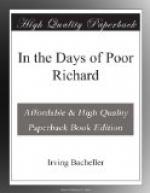“This is alarming,” said Jack.
“My boy an ill wind is blowing on us,” the Governor went on. “We have all too many Arnolds in our midst. Our currency has depreciated until forty shillings will not buy what one would have bought before the war. The profit makers are rolling in luxury and the poor army starves. The honest and patriotic are impoverished while those who practise fraud and Toryism are getting rich.”
Depressed by this report of conditions in America Jack set out for Washington’s headquarters on the Hudson. Never had the posture of American affairs looked so hopeless. The Governor had sold him a young mare with a white star in her forehead and a short, white stocking on her left fore-leg, known in good time as the horse of destiny.
“She was a well turned, high spirited creature with good plumes, a noble eye and a beautiful head and neck,” Jack wrote long after the day he parted with her. “I have never ridden a more distinguished animal. She was in every way worthy of the task ahead of her.”
When he had crossed the King’s Ferry the mare went lame. A little beyond the crossing he met a man on a big, roan gelding. Jack stopped him to get information about the roads in the north.
“That’s a good-looking mare,” the man remarked.
“And she is better than she looks,” Jack answered. “But she has thrown a shoe and gone lame.”
“I’ll trade even and give you a sound horse,” the man proposed.
“What is your name and where do you live?” Jack inquired.
“My name is Paulding and I live at Tarrytown in the neutral territory.”
“I hope that you like horses.”
“You can judge of that by the look of this one. You will observe that he is well fed and groomed.”
“And your own look is that of a good master,” said Jack, as he examined the teeth and legs of the gelding. “Pardon me for asking. I have grown fond of the mare. She must have a good master.”
“I accepted his offer not knowing that a third party was looking on and laying a deeper plan than either of us were able to penetrate,” Jack used to say of that deal.
He approached the little house in which the Commander-in-Chief was quartered with a feeling of dread, fearing the effect of late developments on his spirit.
The young man wrote to Margaret in care of Franklin this account of the day which followed his return to camp:
“Thank God! I saw on the face of our Commander the same old look of unshaken confidence. I knew that he could see his way and what a sense of comfort came of that knowledge! More than we can tell we are indebted to the calm and masterful face of Washington. It holds up the heart of the army in all discouragements. His faith is established. He is not afraid of evil tidings. This great, god-like personality of his has put me on my feet again. I was in need of it, for a different kind of man, of the name of Arnold, had nearly floored me.”




